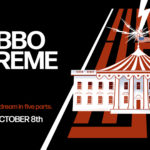
In the first episode of HBO’s Here and Now, which airs February 11, a character utters the words epicureanism, presentism, and hedonism in the span of a few seconds. Speaking of hedonism: there’s also a lot of sex on this show. (This is HBO, after all). Yet even this element gets the philosophical treatment; in Here and Now, the person getting fucked is usually not the one getting screwed.
On its face, the show is a family drama—a familiar genre to creator Alan Ball, who won an Oscar for writing American Beauty and also created the Emmy- and Golden Globe-winning Six Feet Under. Here and Now is centered on Greg (Tim Robbins) and Audrey (Holly Hunter), Portland parents of four. But there’s a twist: as Ball says, “I didn’t want it to be about just another white family having sibling rivalry and childhood trauma and health scares . . . because I’ve seen that so many times.”
Instead, he took a multicultural turn, imagining a family in which two social-justice warriors adopt children from different countries. Ball also added a magical element, giving one of those children hallucinations which may be a gateway into another character’s mind—then used the hybrid premise as a way to investigate our anxious times. “Just being alive today in America is kind of an existential crisis,” he says during a phone interview.
In the pilot episode, Greg, a philosophy professor who’s spent a career arguing for empathy, turns 60 and announces to the room of liberal, educated elites at his party, “When I was young, I thought the purpose of life was . . . to use our minds to bring light into the darkness. . . . I feel embarrassed even articulating that. Because I look at the world . . . and all I see is ignorance, hatred, terror, and rage. We lost, folks.”
Ball calls himself an armchair Buddhist—“I meditate daily, but at such a beginner level”—and says he was influenced by “the concepts of ‘be here now,’ and of the ‘here and now.’ . . . That’s a big part of my understanding of Buddhism: the importance of choosing empathy, and not allowing fear to get its hooks into you and send you off into a spiral of distorted thinking.”
HBO bought the show based on its pilot, which Ball wrote and directed. Shortly after Ball put together a writers’ room for the rest of the series, Donald Trump won the election. The day after, he recalls, “We were all shell-shocked, and some of us were crying. We put half a bottle of rum away between us. But then we thought, let’s just make this part of the show. . . . At that point, it became more about the ‘here and now’ in terms of America in the Trump years.”
Subsequent episodes tackle police-force racism, the rise of white supremacy, and the fight for reproductive rights. At an academic conference, Greg rants that the world is “a raging wall of fuckery from here to forever.”
But the show isn’t interested in commenting on politics—or climate change, or insert your anxiety-inducing new reality here—so much as on our responses to terrifying times. Each character finds comfort in different places: technology, empty sex, extramarital flirting, liberal do-gooding. Throughout, they debate the efficacy of fear, anger, rage, righteousness, and love.
Ball says he didn’t want the show to be “a liberal screed.” To wit, it also explores the limits of progressive ideology and the toxicity of self-satisfaction. In the fourth episode, Audrey tells her daughter that she envies her life, that it must be easier to not be saddled with trying to help the world.
Still, Ball is candid about his own response to what he calls “our national nightmare,” saying, “America being a metaphor for justice and freedom—good people and hard work get rewarded, and bad guys get punished, what we all grew up believing because we saw it on TV and in movies—that just seems to me like a huge giant lie these days.” At times, it feels as if Ball is using the trial and error of story creation to work through these feelings.
After the first trailer for Here and Now was released, several media outlets compared it to another multicultural family drama known for sowing the seeds of compassion: This Is Us. Both shows feature modern families with adult children, one of whom is an African-American adopted by white parents. Ball hasn’t seen the NBC ratings juggernaut and wrote his pilot before it aired, but he welcomes a comparison between his show and “something that seems to speak to so many people,” he says.
Although there are fundamental differences between the two in tone—This Is Us tugs on heartstrings while Here and Now trades in metaphor—the series do share an agenda. They’re both a salve. This Is Us suggests that, no matter the tragedies we face, if we have love, we are strong. Here and Now suggests that empathy and compassion can heal psychic pain. Ball’s show also doles out empathy to its viewers, as when a character says, “Everybody’s scared. We are hardwired for fear. That’s how we’ve survived since we climbed out of the trees and into the jungle. If I wasn’t scared, I’d be scared.”
That character, Henry (Andy Bean), is comforting Ramon (Daniel Zovatto), Greg and Audrey’s youngest son, who’s been hallucinating. “I have had experiences in my life that were somewhat magical,” Ball explains. “I know it could’ve just been wishful thinking or thought projection or whatever, and I don’t really care. I do believe that there is a deeper level that connects all of us, and sometimes in our lives we get a glimpse into that.”
Ramon’s affliction leads his father, Greg, to search for similarly magical experiences in his own life. When he encounters a stag on a road, he exits his car and follows it into the woods, believing he was meant to. There, the stag stares him in the eyes—and defecates. Greg exits the woods filthy and frustrated.
That night, after years of growing apart, Greg and Audrey reconnect. As Ball explains, “In a way, when the deer shits in the woods in front of him, that’s the deer saying, ‘You’re looking in the wrong place, dude.’” The true magic in this protagonist’s life is the love he shares with his wife; sounds like a traditional family drama after all.


